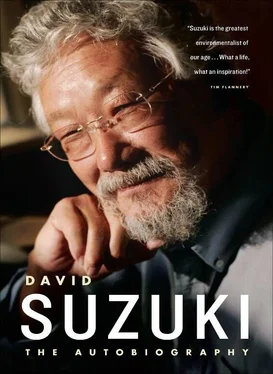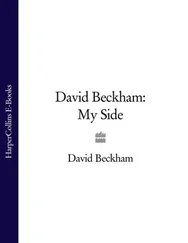In Tofino, Paiakan was feted like a relative by the Nuu-chah-nulth. As he spoke through the translator about the struggle to protect his territories, you could have heard a pin drop. These were far from wealthy people, yet they collected thousands of dollars to help their brother from the Amazon. One old man hunted around in one of his pockets and finally came up with a hundred-dollar bill folded into a small square and obviously carefully saved for a long while. “He really needs it,” was all he said as he threw it into a pot. Canadian First Nations people understood that the Kaiapo were going through what their own people had suffered and felt an instant bond with them.
At our cottage on Quadra Island in the Strait of Georgia, I showed them how we dig clams. Irekran and Paiakan loved looking for clams as a kind of game, but when I broke one open and ate it raw, they were revolted and lost interest in clamming. They wanted to eat only what they were familiar with — chicken, white-fleshed river fish, beans, farinha, rice, and bread, which they loved toasted. When we fed them halibut, they found the taste and texture a satisfactory substitute for freshwater white-fleshed fish.
But when we caught a small halibut on a fishing trip with a group of First Nations leaders, Paiakan was appalled. He'd never seen a flat fish, with both eyes on the top of its head, and found it monstrous — ugly and unappetizing. When I told him that was what he'd been eating, he never touched halibut again. At first, he and his family wouldn't eat salmon, either — too red.
Paiakan often surprised us. On one trip, we were driving up Vancouver Island toward Port Hardy and spotted a huge plume of smoke. As we drew nearer, we could see that an area of forest had been clear-cut and the slash gathered into massive piles and set alight. Paiakan remarked, “Just like Brazil.” Another time, having flown over large areas of clear-cut that were covered in snow and visible as a checkerboard pattern from the plane, he said, “Brazilians destroy the forest because they are poor and uneducated. Why do Canadians?” When he first settled in our house, I drove him through downtown Vancouver, figuring he would be impressed with the cleanliness of the streets, the gleaming buildings, and the stores filled with goods. His response was unexpected: “To think all this comes from the Earth. How long can it go on?”
We took him to Alert Bay, home of the Kwakwaka'wakw people. On the ferry from Port McNeill on Vancouver Island to Alert Bay on Cormorant Island, several Kwakwaka'wakw kids kept coming by to look at Paiakan and shyly ask us who he was and where he was from. They could see he was an Indian, but he looked unlike any they knew. The boys were typical modern First Nations kids, dressed in jeans and runners with caps on backwards, and Paiakan imperiously ignored them. It seemed he could see that these youngsters were what the Kaiapo could become, and he did not like it.
When we arrrived at the ferry terminal in Alert Bay, we were met by Kwakwaka'wakw dancers in full regalia and led by our friend Vera Newman. We were feted in the spectacular communal “big house” and were again showered with gifts of money. (When I visit Alert Bay now, more than fifteen years later, people still ask about Paiakan.) We traveled to Haida Gwaii, where Paiakan was taken out on Lootaas , the canoe that was paddled from Vancouver to Haida Gwaii during the battle to save South Moresby. Everywhere we went, Paiakan made an indelible impression with his impassioned and articulate plea for help in protecting his forest home.
About three weeks after the family arrived, Irekran, a very severe-looking, imperious young woman, called our names and motioned us to approach. Paiakan translated: “Our children should be in Aucre studying. It's cold here. I miss my family. You promised to get us an airplane. Where is it?” Tara and I were nonplussed. Airplane? Where had she got that idea? As we racked our brains, we realized that back in Altamira, when we had gathered to discuss what to do about the death threats, one idea put forward was to establish a fund for Paiakan to use whenever he needed a plane to leave the village. Irekran must have interpreted this as a promise to buy a plane. To her, it appeared as if we just plunked down money whenever we wanted anything. A plane must have seemed a reasonable demand.
It so happened that I was scheduled to go to England the following week. There I called Anita Roddick, creator of the Body Shop empire, who had attended the Altamira gathering, met Paiakan, and been impressed by him. I told her about Irekran's demand, explaining that having a plane permanently available at Aucre would allow Paiakan to remain in touch and effective from the safety of the village but would have many other uses. It could be used to survey and police the vast area of Kaiapo territory, and it could transfer sick people and elders when needed. Anita had just had a meeting with her shop franchisees, where she had talked about Paiakan and his struggle, and the delegates had donated money from their own profits. Anita wrote us a check for US$100,000.
Toward the end of the family's stay with us, the ever-supportive gang at the Western Canada Wilderness Committee printed thousands of copies of a paper devoted to Paiakan and the issues in the Amazon. We joined with them and the Environmental Youth Alliance to hold several packed events at high school auditoriums. We all gave rousing speeches, and in the end, Haida leader Guujaaw got up to drum and sing and invited Oe and Tania and Severn and Sarika to accompany him. These wonderful events helped to raise more money for Paiakan's work.
After six weeks of living with us, Paiakan and his family decided it was safe to return home. They had raised thousands of dollars, made contacts with aboriginal “relatives” up and down the west coast of Canada, and would return with the promise of a plane soon to follow.
When we arrived at the airport, it seemed we had lived through a lifetime together, and to my surprise, Irekran began to weep inconsol-ably. In their society, there is a ritual kind of wailing that I had seen when Paiakan was welcomed home and when we witnessed a funeral, but this was different; I felt she really was sorry to leave us. We were soon all reduced to tears.
“Come and visit us,” Paiakan begged, and we decided that would be a wonderful adventure. So we wished them well and promised we would travel down soon.
Meanwhile, in Canada, Tara discovered there was a whole catalog of used planes around the world and determined that a Cessna seemed the best choice. She also found a pilot named Al “Jet” Johnson, who had flown for decades with American Airlines, lived in Vancouver, and was a close friend of Sea Shepherd Conservation Society founder Paul Watson, who had gone to Altamira.
Tara contacted Al, and he offered to check a used plane we had found in Galveston, Texas. He reported that the Cessna Utility 206 was in good shape. It cost $50,000, which would leave enough to ensure a proper maintenance schedule. He recommended we buy it and have the seats pulled out so that extra gas tanks could be installed, and he would fly it to Brazil for us. Al is a true hero. In full hurricane season, he hopped and skipped across the Caribbean and along the north coast of South America, phoning in his adventures from cheap hotels in Guyana or Suriname. After navigating the plane through Brazilian authorities, he piloted it for Paiakan and the village for several months before finally returning to Canada.
TARA AND I DECIDED to go to Aucre the following summer. We believed Paiakan's invitation was sincere, and the children already had a lot of wilderness experience and were keen to go. But I was also worried. After all, Sarika was only seven and Severn was ten — what if something happened to them? We would be so far away from help. I knew Tara was as concerned as I was, but she expressed only excitement and enthusiastically went about arranging the myriad details of the trip. Our Haida friend Miles Richardson decided to join us, along with his girlfriend, Patricia Kelly, from Chilliwack in the Fraser Valley, east of Vancouver.
Читать дальше


![David Jagusson - Devot & Anal [Hardcore BDSM]](/books/485905/david-jagusson-devot-anal-hardcore-bdsm-thumb.webp)









